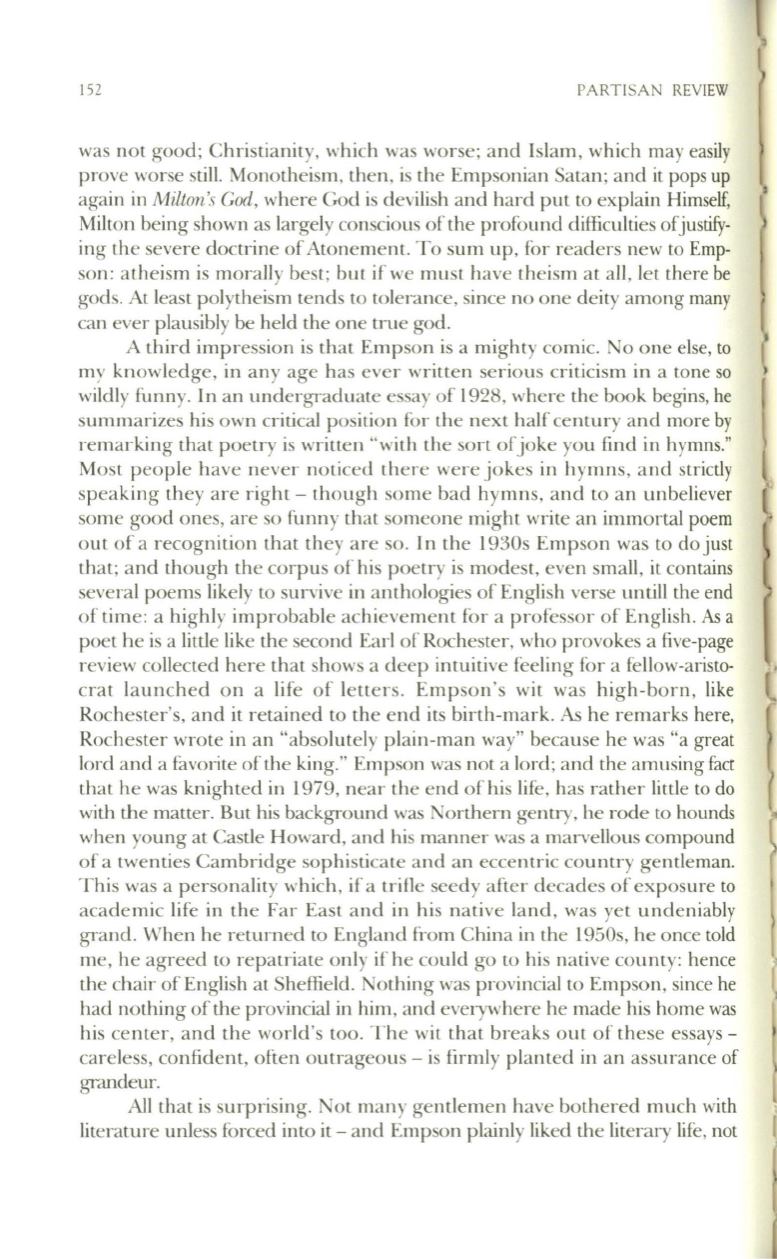
ISZ
PARTISAN REVIEW
was not good; Christianity, which was worse; and Islam, which may easily
prove worse still. Monotheism, then, is the Empsonian Satan; and it pops up
again in
Milton's God,
where God is devilish and hard put to explain Himself,
Milton being shown as largely conscious of the profound difficulties ofjustify–
ing the severe doctrine ofAtonement. To sum up, for readers new to Emp–
son: atheism is morally best; but if we must have theism at all, let there be
gods. At least polytheism tends to tolerance, since no one deity among many
can ever plausibly be held the one true god.
A third impression is that Empson is a mighty comic. No one else, to
I
my knowledge, in any age has ever written serious criticism in a tone so
)
wildly funny. In an undergraduate essay of 1928, where the book begins, he
summarizes his own critical position for the next half century and more by
remarking that poetry is written "with the sort ofjoke you find in hymns."
Most people have never noticed there were jokes in hymns , and strictly
speaking they are right - though some bad hymns, and to an unbeliever
(.
some good ones, are so funny that someone might write an immortal poem
out of a recognition that they are so. In the 1930s Empson was to do just
that; and though the corpus of his poetry is modest, even small, it contains
several poems likely to survive in anthologies of English verse untill the end
oftime: a highly improbable achievement for a professor of English.
As
a
poet he is a little like the second Earl of Rochester, who provokes a five-page
review collected here that shows a deep intuitive feeling for a fellow-aristo–
crat launched on a life of letters. Empson's wit was high-born, like
Rochester's, and it retained to the end its birth-mark.
As
he remarks here,
Rochester wrote in an "absolutely plain-man way" because he was "a great
lord and a favorite of the king." Empson was not a lord; and the amusing fact
that he was knighted in 1979, near the end of his life, has rather little to do
with the matter. But his background was Northern gentry, he rode to hounds
when young at Castle Howard, and his manner was a marvellous compound
of a twenties Cambridge sophisticate and an eccentric country gentleman.
This was a personality which, if a trifle seedy after decades of exposure
to
academic life in the Far East and in his native land, was yet undeniably
grand. When he returned
to
England from China in the 1950s, he once told
me, he agreed to repatriate only if he could go
to
his native county: hence
the chair of English at Sheffield. Nothing was provincial to Empson, since he
had nothing of the provincial in him, and everywhere he made his home was
his center, and the world's too. The wit that breaks out of these essays–
careless, confident, often outrageous - is firmly planted in an assurance of
grandeur.
All that is surprising. ot many gentlemen have bothered much with
literature unless forced into it - and Empson plainly liked the literary life, not


